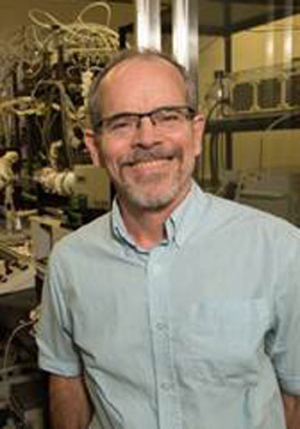We can all breathe a little easier with Mike Harold around.
That’s not a cliché. Harold, professor and chair of chemical and biomolecular engineering at the University of Houston Cullen College of Engineering, has spent much of the past 13 years working to improve air quality in the Houston region and beyond. As founding director and principal investigator of the Texas Center for Clean Engines, Emissions and Fuels (TxCEF), he has helped develop technologies that reduce harmful vehicle emissions, performed testing and verification on emission-reducing technologies developed by outside groups, and worked to improve fuel economy for medium- and heavy-duty vehicles.
Thanks largely to his work with the center – including his efforts as an educator, scholar, and colleague – Harold has won UH’s most prestigious faculty honor, the Esther Farfel Award. The award, which was presented to Harold last night at UH’s Faculty Awards Dinner, is given annually to a professor who has excelled in teaching, research and service.
“It's a great honor to receive the Farfel especially since it rewards accomplishments that go beyond research,” said Harold. “While I’m proud of my research, I’m more proud of helping my colleagues and students succeed.”
Harold is unusual among Farfel winners in at least two respects: He’s an alumnus of UH and has had a relatively short career here as a professor.
Harold earned his Ph.D. in chemical engineering from the Cullen College in 1985, studying under the guidance of his now-colleague Dan Luss. After graduating, he took a faculty position at the University of Massachusetts at Amherst, where he became a tenured associate professor.
Wanting to see more of his research applied toward solving real-world problems, he left UMass in the early 1990s for an R&D position with DuPont Company. “At DuPont I got a lot of experience in applied research and technology development and learned how to get technology to the marketplace,” he said. “I thought I was going to be with DuPont on the corporate/management ladder for the next 30 years of my working life. But as they say, predictions are fine as long as they’re not made about the future.”
In the late 1990s, though, the company began to shift its focus away from Harold’s areas of expertise. Coincidentally, around that time, he was approached by the college about the recently opened chairman post in chemical and biomolecular engineering. Though he initially wasn’t interested, he soon reconsidered and eventually returned to the university.
His first stint as department chairman ran from 2000 to 2008. It was during this period that he founded TxCEF, then known as the Texas Diesel Testing and Research Center. In doing so, he created a structure where he could put his research to good use, as well as one that helped strengthen the department as a whole.
“I saw starting the Diesel Center as an opportunity to help solve some of our pressing air pollution problems faced in the Houston region. The technical challenges were aligned with the research expertise and interests of myself and some of my faculty colleagues. The Diesel Center activities exposed us to practical issues that had fundamental roots. We could attack the practical issues with applied research and the fundamental roots with basic research,” he said, adding, “It's been a great match. The center catalyzed a collaborative spirit within our department, which helped lead to the hiring of people like Bill Epling, Jeff Rimer and Lars Grabow, who I’m happy to be working with along with senior colleagues like Vemuri Balakotaiah and Dan Luss.”
Over the years, the center has partnered with multiple businesses in the development of engine and engine emissions technology, including Cummins Engines and Ford Motor Company. It has also worked with and been supported by many government bodies, such as the City of Houston, the Metropolitan Transit Authority of Harris County, the Texas Commission on Environmental Quality, and the US EPA
In addition to being a vehicle for both research and service to the community, the center has proven to be a practical training ground for graduate students, said Harold. In recent years, these students have gone on to win positions at other research institutions and have been hired to continue their research at prominent companies in the engine and emissions treatment sectors.
“As professors, we all pride ourselves in teaching students the book knowledge and strive to discover new knowledge. I enjoy getting into the classroom and also training my graduate students on how to do research. One of our great rewards for being a professor is to train students for the real world. In our department we do a pretty good job of doing that. Our students do well when they leave UH. They do most of the work so it’s nice to see they’re rewarded.”
In recent years Harold’s work has expanded to include not just engines and emissions, but also the development of biofuels from aquatic biomass as well as high purity hydrogen generation for fuel cells. And in the past few months his administrative workload has increased substantially. Earlier this year he began his second stint as chairman of chemical and biomolecular engineering while also becoming the college’s interim associate dean for administration and research.
While this is a heavy workload by practically any standard, in many ways it is what Harold was looking for when he came to the Cullen College as a professor 13 years ago.
“The main reason I returned to academia was to be a leader and manager and to do technical work at the same time. As a professor I’ve tried to seek that balance,” he said. “The Farfel recognizes faculty who manage to do that well. That’s why receiving this honor is pretty special. ”
